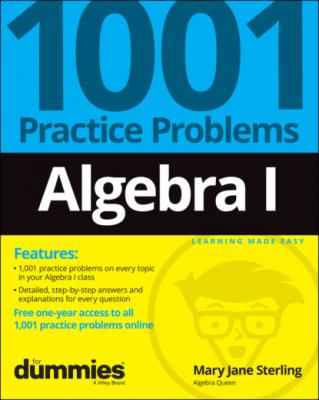Algebra I: 1001 Practice Problems For Dummies (+ Free Online Practice). Mary Jane Sterling
Чтение книги онлайн.
Читать онлайн книгу Algebra I: 1001 Practice Problems For Dummies (+ Free Online Practice) - Mary Jane Sterling страница 10
 the Book
the Book
In addition to what you’re reading right now, this book comes with a free, access-anywhere Cheat Sheet that includes tips and other goodies you may want to have at your fingertips. To get this Cheat Sheet, simply go to www.dummies.com and type Algebra I 1001 Dummies Cheat Sheet into the Search box.
The online practice that comes free with this book offers you the same 1,001 questions and answers that are available here, presented in a multiple-choice format. The beauty of the online problems is that you can customize your online practice to focus on the topic areas that give you trouble. If you’re short on time and want to maximize your study, you can specify the quantity of problems you want to practice, pick your topics, and go. You can practice a few hundred problems in one sitting or just a couple dozen, and whether you can focus on a few types of problems or a mix of several types. Regardless of the combination you create, the online program keeps track of the questions you get right and wrong so you can monitor your progress and spend time studying exactly what you need.
To gain access to the online practice, you simply have to register. Just follow these steps:
1 Register your book or ebook at Dummies.com to get your PIN. Go to www.dummies.com/go/getaccess.
2 Select your product from the dropdown list on that page.
3 Follow the prompts to validate your product and then check your email for a confirmation message that includes your PIN and instructions for logging in.
If you don’t receive this email within two hours, please check your spam folder before contacting us through our Technical Support website at http://support.wiley.com or by phone at 877-762-2974.
Now you’re ready to go! You can come back to the practice material as often as you want — simply log in with the username and password you created during your initial login. No need to enter the access code a second time.
Your registration is good for one year from the day you activate your PIN.
Where to Go for Additional Help
The written directions given with the individual problems are designed to tell you what you need to do to get the correct answer. Sometimes the directions may seem vague if you aren’t familiar with the words or the context of the words. Go ahead and look at the solution to see if that helps you with the meaning. But if the vocabulary is still unrecognizable, you may want to refer to the glossary in an algebra book, such as Algebra I For Dummies, written by yours truly and published by the fine folks at Wiley.
The solution to each problem is given at the end of its respective chapter. But you may not be able to follow from one step to the next. Is something missing? This book is designed to provide you with enough practice to become very efficient in algebra, but it isn’t intended to give the step-by-step explanation on how and why each step is necessary. You may need to refer to Algebra I For Dummies or Algebra I Essentials For Dummies (also written by me and published by Wiley) to get more background on a problem or to understand why a particular step is taken in the solution of the problem.
Part 1
The Questions
IN THIS PART …
Performing basic operations (Chapters 1 through 6)
Changing the format of algebraic expressions (Chapters 7 through 12)
Solving equations (Chapters 13 through 17)
Applying algebra by using formulas and solving word problems (Chapters 18 through 20)
Graphing (Chapters 21 through 23)
Chapter 1
Signing on with Signed Numbers
Signed numbers include all real numbers, positive or negative, except 0. In other words, signed numbers are all numbers that have a positive or negative sign. You usually don’t put a plus sign in front of a positive number, though, unless you’re doing math problems. When you see the number 7, you just assume that it’s +7. The number 0 is the only number that isn’t either positive or negative and doesn’t have a plus or minus sign in front of it; it’s the dividing place between positive and negative numbers.
The Problems You’ll Work On
As you work with signed numbers (and positive and negative values), here are the types of problems you’ll do in this chapter:
Placing numbers in their correct position on the number line — starting from smallest to largest as you move from left to right
Performing the absolute value operation — determining the distance from the number to 0
Adding signed numbers — finding the sum when the signs are the same and finding the difference when the signs are different
Subtracting signed numbers — changing the second number to its opposite and then using the rules for addition
Multiplying and dividing signed numbers — counting the number of negative signs and assigning a positive sign to the answer when an even number of negatives exist and a negative sign to the answer when an odd number of negatives exist
What to Watch Out For
Pay careful attention to the following items when working on the signed number problems in this chapter:
Keeping track of the order of numbers when dealing with negative numbers and fractions
Working from left to right when adding and subtracting more than two terms
Determining the sign when multiplying and dividing signed numbers, being careful not to include numbers without signs when counting how many negatives are present
Reducing fractions correctly and dividing only by common factors
Placing Real Numbers on the Number Line
1–6 Determine the